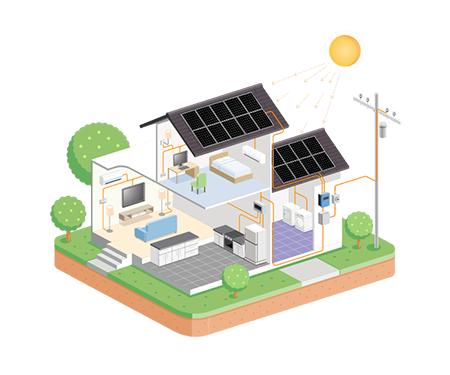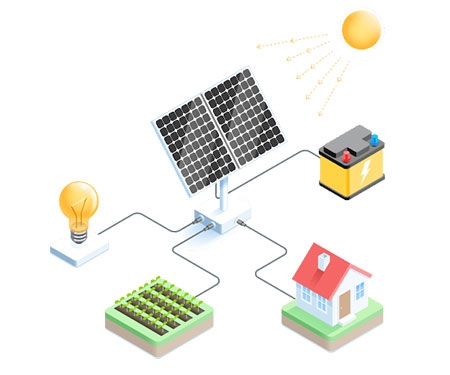In an era increasingly defined by the pursuit of sustainable living and energy independence, residential solar panels emerge as a cornerstone of eco-friendly home solutions. This innovative technology harnesses the sun's energy, converting it into electricity to power our daily lives, thereby reducing reliance on fossil fuels and decreasing household carbon footprints. As the world grapples with the effects of climate change, more homeowners are turning to solar power as a viable alternative to traditional energy sources.
Solar panels, composed of photovoltaic (PV) cells, are designed to capture solar radiation and convert it into usable electricity. The process begins when sunlight activates the PV cells, creating an electrical current. This direct current (DC) is then converted into alternating current (AC) through an inverter, the form of electricity used to power most home appliances. The installation of these systems can vary widely, depending on roof size, orientation, and local climate conditions, but the end goal is the same: To provide a renewable source of energy that can significantly reduce electricity bills.
Home Solar Panels for a Better Future
Switching to residential solar panels will save you money. It's that simple. However, not all solar panels are created equal. With PowerHome online shop, you'll feel great about your decision to go with solar energy, knowing that you've chosen reliable, highly efficient solar panels backed by an industry-leading power performance warranty.
The financial incentives for adopting solar power are compelling. Many governments offer subsidies, tax breaks, and rebates to encourage the shift towards renewable energy. These incentives, along with the decreasing cost of solar technology, make solar systems increasingly accessible to a broader range of homeowners. Moreover, solar panels can increase property values, offering a lucrative return on investment for those considering future home sales.

Affordable Residential Solar Power
If you have access to the electric grid and are looking for the most value for your investment, residential solar panels are the way to go. At PowerHome, we are committed to offering the lowest up-front costs and the most affordable system overall. This way, you can easily add solar without worrying about your finances. You'll be able to relax, sit back, and watch your electric bills go down.
Our solar panels are designed and manufactured to offer you a sleek, all-black design that provides the highest level of efficiency. Not to mention, they are built to withstand strong winds, extreme temperatures and snowstorms.
Residential Solar Panel Features
- Advanced technology designed to withstand harsh conditions while providing excellent power output and high efficiency.
- Top-class performance that gives you more power with fewer panels, which adds up to more savings.
- Superior aesthetics featuring a sleek, black, low-profile design. The only statement your panels make will be on your electric bill, which will be significantly reduced.
- In addition, your home solar system comes equipped with an efficient inverter to convert the DC power your system generates into AC power your home can use. This way, your home gets first dibs on the energy it creates before sending any excess back into the grid and spinning back your meter.
How Solar Panels Work
Solar panels work by capturing energy from the sun and converting it into electricity for homes and businesses. Once installed on your roof, solar panels convert sunlight into direct current (DC) electricity that flows into an inverter. The inverter converts the DC electricity into alternating current (AC) that your home can use. Any additional power generated that you don't use gets pushed back into the electric grid for a credit on your electric bill.

Advantages of Solar Energy
- Solar energy saves you money now and in the future. At PowerHome, we specialize in solar and roofing solutions for homes of every shape and size.
- Once you have solar panels on your home, your home will generate its own electricity for decades to come.
- The typical residential solar panel system can save you tens of thousands of dollars over the lifespan of your panels. That's a lot of savings on your electric bill.
- Not only does solar energy save you money now, but it can also help the environment.
- And, since most of us have sun hitting our roofs, it's the best, most affordable way to generate clean energy for your home.
- You'll gain independence from utility companies and their seemingly unending rate hikes.

3 Simple Steps to Solar Panels for Your Home
To install solar panels on your home, simply follow these three simple steps to start generating electricity from the sun, saving money on energy costs while doing your part to help the environment.
Step 1: Evaluate Your Home's Energy Needs and Roof Conditions
Before installing solar panels, you first need to assess your home's energy needs. This includes knowing your average monthly electricity consumption, which helps determine the size of the solar panel system needed. You will also need to examine the condition of your roof, including its size, orientation, tilt angle, and the presence of shading, such as trees or other buildings. All of these factors will affect the efficiency of the solar panels and the installation decision. It's also essential to check whether the roof's structure is capable of carrying the additional weight of the solar panels.
Step 2: Choose the right solar panels and installation service
Choosing the right solar panel is very crucial. There are several types of solar panels on the market, including monocrystalline, polycrystalline and thin-film solar panels, each with different efficiencies and costs. Considering the long-term energy output and maintenance costs, choosing high-efficiency solar panels may be the more economical option. It is also equally important to choose a reliable supplier and installation service. It is recommended to choose a professional installation team that is experienced and holds the proper certifications, as they will not only provide high-quality installation services, but also ensure the safety and efficiency of the solar system.
Step 3: Installation and Maintenance
The installation process is usually done by a professional team and includes mounting the solar panels, wiring and configuring the inverter. Once the installation is complete, proper maintenance is key to ensuring that the solar system operates effectively and efficiently over the long term. Regularly cleaning the solar panels to prevent dust, leaves or other debris from covering the surface will keep the panels performing at their best. It is also essential to monitor the day-to-day operation of the system, checking the condition of the inverter and connected systems in a timely manner. Some solar companies offer remote monitoring services that allow you to monitor the effectiveness of your system in real time and identify and resolve problems in a timely manner.

By following these three simple steps, you can successfully install a solar energy system in your home and enjoy clean, renewable solar power that brings both financial and environmental benefits to your home.
Solar Battery Storage
Reliable electricity when you need it – that's peace of mind. By adding a storage unit to your PowerHome residential solar system, you can generate clean, renewable energy for your home that is available when you need it. Even in a power outage, you won't feel powerless. If you live in a hurricane-prone area or often have rolling blackouts and other unexpected outages, battery storage is essential for you and your family. PowerHome gives you that chance to have additional independence from the power company.

Despite these benefits, potential adopters must consider several factors. Initial installation costs, though offset by long-term savings, can be substantial. Additionally, the efficiency of solar panels can be influenced by geographic location, with areas receiving more sunlight naturally yielding more energy. Therefore, understanding the local solar potential and the specific needs of one's home is crucial in maximizing the benefits of solar power. This introduction to residential solar panels highlights not only their environmental and economic benefits but also the considerations homeowners must weigh when deciding to invest in this green technology.
(1).png)
(1).png)